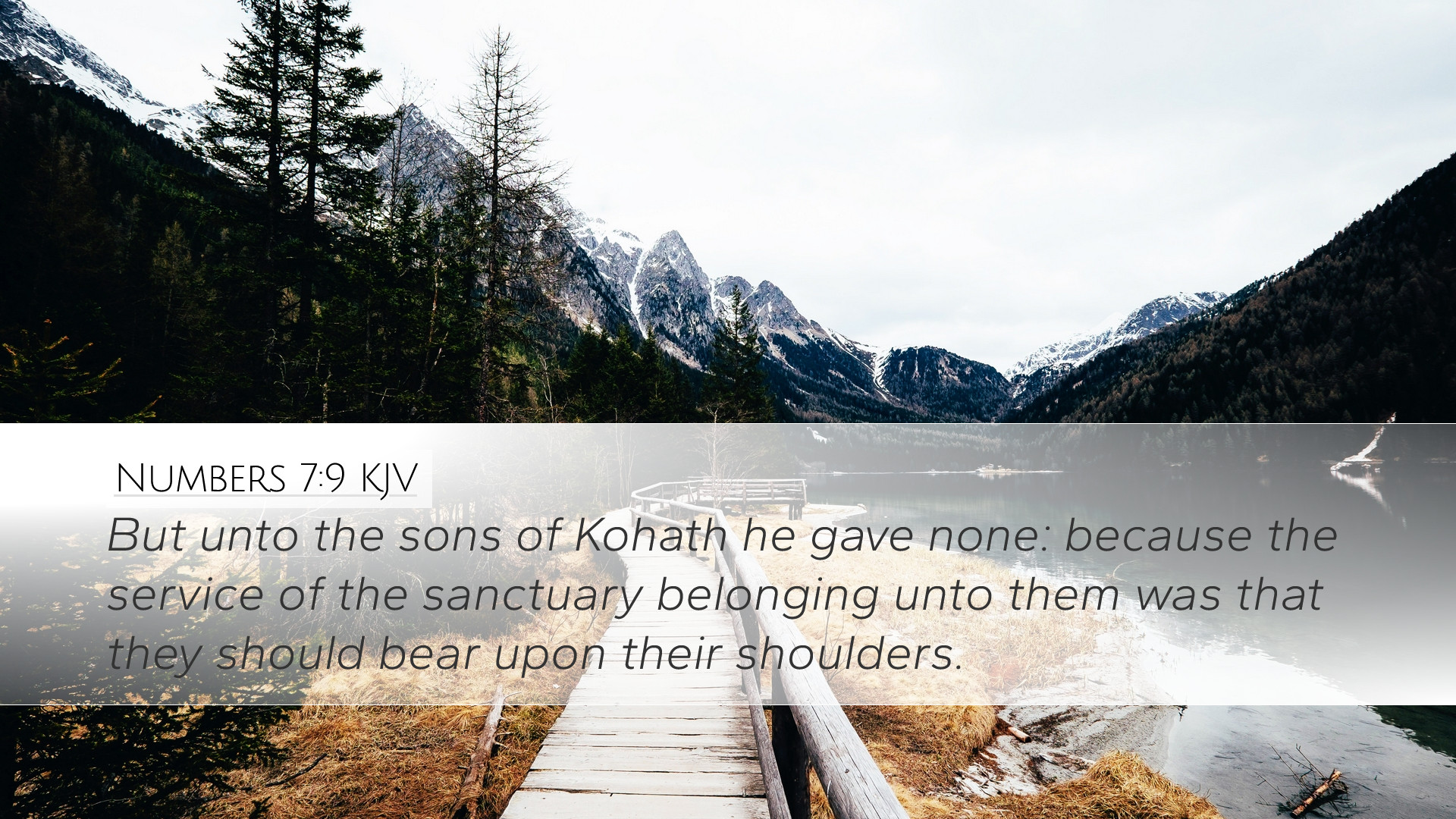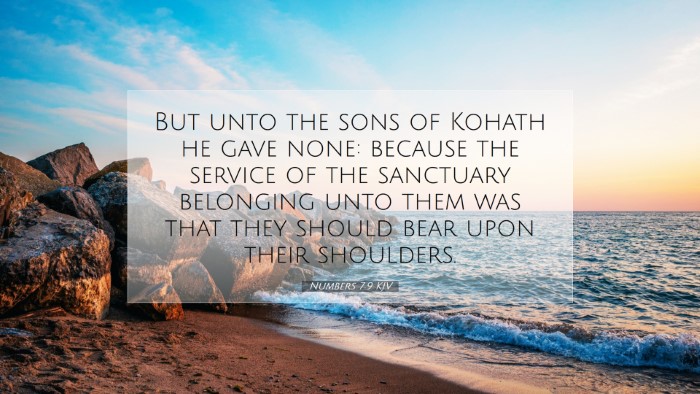Commentary on Numbers 7:9
Numbers 7:9 states:
"But unto the sons of Kohath he gave none: because the service of the sanctuary belonging unto them was that they should bear upon their shoulders."
Introduction
This verse is found in the context of the great dedication of the tabernacle and the offerings brought by the leaders of Israel. The focus is particularly on the special duties assigned to the Levites, especially those of the family of Kohath. This commentary will summarize insights from notable public domain commentaries, giving a comprehensive understanding of this biblical text for pastors, students, theologians, and scholars.
The Context of the Verse
In the preceding chapters, Moses records the arrangement and duties concerning the Levites, the priests, and the tabernacle service. Set against the backdrop of Israel’s journey in the wilderness and their impending entry into the Promised Land, it becomes crucial to delineate the roles within the Levitical family. The sons of Kohath were specifically designated for the most sacred items in the tabernacle.
Matthew Henry observes that the Kohathites bore the most significant burdens in the service of the tabernacle, emphasizing the honor and gravity of their assignment. They were responsible for carrying the ark, the table, the lampstand, and the altars, which symbolized the presence of God among His people.
The Significance of "He Gave None"
Albert Barnes highlights the phrase "he gave none" in relation to the fact that the Kohathites were not given any specific gifts or offerings like their counterparts. This indicates a special calling; they were set apart not for the receiving of earthly provisions but for spiritual service. Their function was unique, and this absence of offerings points to the complete dedication of their lives to the Lord's service.
Adam Clarke adds that this was a demonstration of the unique responsibilities and the weight of glory conferred upon them. The symbolism of their responsibilities speaks volumes about spiritual leadership and sacrificial devotion to God.
The Role of the Sons of Kohath
The sons of Kohath were tasked with bearing the most sacred items of the tabernacle upon their shoulders. This physical representation serves as a profound spiritual metaphor for carrying the weight of God's presence and His covenant among the people. In his commentary, Henry elaborates that their service was not merely physical but also deeply spiritual. It signifies the need to carry God's presence as a vital responsibility for those in leadership.
Kohath's unique role beckons reflection on the nature of service leaders provide, especially in spiritual contexts. As Barnes points out, it serves as a reminder that true service to God may often come without public recognition or earthly rewards. The weight of spiritual responsibility is heavier than any material offerings.
Theological Insights
- Symbol of Burden Bearing: The act of bearing sacred objects is emblematic of the burdens that leaders must carry in their ministry.
- Dedication and Holiness: Kohath's family exemplifies how dedication to God's service requires a commitment to holiness and purity.
- The Presence of God: Carrying the ark, a symbol of God’s presence, reflects the pastoral duty of leading congregations into understanding and experiencing God's presence among them.
Applications for Modern Readers
This verse evokes a call for introspection regarding our roles in the church and community. For pastors, it encourages them to recognize their sacred calling and the weighty responsibility of leading others in faith. Students and scholars may reflect on the diligent preparation and study required for such a ministry. The lessons of service without expectation of reward can resonate deeply within the hearts of believers.
Furthermore, the Kohathites remind us of the necessity of carrying God's presence into our daily lives, stressing that our spiritual work must be undertaken with reverence and commitment. Each believer is invited to consider how they bear the presence of God in their environments, modeling faithful service and leadership.
Conclusion
Numbers 7:9 presents a profound reflection on the responsibilities of spiritual leaders and their significant call to carry the weight of God's presence. Through the insights of Matthew Henry, Albert Barnes, and Adam Clarke, the depth of this scripture is revealed, encouraging all to embrace their roles with the utmost seriousness and dedication. In doing so, they align themselves with the sanctity and significance of their service, ensuring that they contribute meaningfully to the body of Christ.


